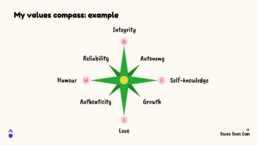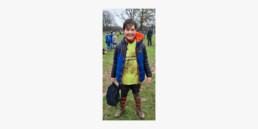Embracing Pragmatism in Teaching, Coaching, Wellbeing… and Life
When I became a doctoral researcher 14 years ago, one of the first steps to examine my ontological and epistemological assumptions. Sorry, what now? The big words were initially utterly overwhelming as well as being entirely unfamiliar, as well as a little intriguing... Was I an interpretivist? A phenomenologist? An existentialist?? Who knew. All I knew was that I was a sleep-deprived newish Mum who’d embarked on this crazy academic journey alongside a middle-leadership role, and my imposter syndrome was in full carnival mode. I was in the midst of a (quite literal) identity crisis when I stumbled, to my relief, against the academic concept of pragmatism; my favourite kind of academic concept – one founded in common-sense. To this day, I unashamedly describe myself in life and work as a pragmatist.

What does that mean in practice? It means I don’t align myself with the fiercely fighting education camps on social media. These days, I observe such debates with a wry amusement. Let’s take children and toilets. There’s a time to say, ‘if you’re still desperate for the toilet in five minutes, let me know. Otherwise, get on with your work’ and a time to let that child go – now. It’s about knowing the child.
Pragmatists do what works, and that’s what I love about it. Pragmatism is about caring less about the things that matter less (like a messy house, in my case) and channelling attention and emotional energy to the things that matter most.
I'm open to debate and discussion, and I have no issue with people challenging me or the ideas I share. Some of my best ideas come from being challenged. For example, I once asked a group of policymakers from Central Africa and Eastern Europe about staff wellbeing in their schools. One of them politely but firmly said, "I think first you should ask us why should we care?" That powerful question is one I now often open my sessions with.
My identity as a teacher, researcher, writer, and speaker is closely tied to being a pragmatist. This means I listen—really listen - using my coaching skills to those who come my way. I constantly collect gems of wisdom and share them with others in education to enable as many people as possible to be the best versions of themselves.
A Pragmatist's Approach to Wellbeing
Wellbeing differs for each of us. I talk with a mix of amusement and frustration about how I can’t bear to be ignored when I greet someone in a school corridor or give an instruction to a class. But someone once said, "That person might not have even seen you." Their head might have been elsewhere – and it made me review my approach and remember that it's very rarely about me… I also refer to my rather casual approach to possessions and my tendency, if I've seen a new glossy stapler on someone's desk, to nip in and borrow it, then forget I've done so.
Pragmatism is an antidote to the FOMO many of us feel. ‘You do you,’ as my teenagers would say. Carve your path and make your way forward. Pragmatism also means that very few approaches are wholly right or wholly wrong. I'm wary of silver bullets; the allegedly brilliant ‘solutions’ to all that is wrong in education that some brandish as if they’re the only ones to have found the Holy Grail.

Small Changes for Big Impact
When I work with my coachees and wellbeing delegates, on mindsets and beliefs that are holding them back, like perfectionism or an urge to apologise, it’s not about changing people. It’s about asking, "How has this belief benefitted me so far, and why is now the time to tweak my approach?" All the work I do is about small changes, not radical transformations.
Ultimately, what do you want your legacy to be? What works for you and your self-care? Is it long lie-ins, reality TV, walks with the dog, or a spa day? Whatever works for you, as long as it doesn’t hurt anyone else (as a wise person said when I first became a sleep-deprived parent), that’s absolutely fine. We all need to feel appreciated, whether it's through bells, whistles and certificates or a quiet word, but be clear – and talk about – what works for you.
Pragmatism is also about being philosophical when things don’t work. The approach I take to all of my work is 'iterative' (another lovely common-sensical academic term. You keep with your approach until you find something that works, and when that stops working, you find another approach. Or, put more bluntly, you keep making it up as you go along..
In education, it's about doing the small things that allow you to live a happy, fulfilled, productive, and meaningful life. That's what I aim to help others achieve.
If you’d like to talk more about my approach to wellbeing, effectiveness, and stakeholder engagement, please get in touch.
Overcoming Limiting Beliefs: Embracing New Perspectives for Personal and Professional Growth
We all have beliefs about ourselves that shape our thoughts, actions, and ultimately, our careers and lives. Some of these beliefs serve us well, while others hold us back from reaching our full potential. These restrictive thoughts are what we call "limiting beliefs." Today, let's explore how to identify and overcome these beliefs to foster personal growth and achievement, drawing inspiration from examples shared by Mary Myatt in interview with me, Dr Emma Kell.
Understanding Limiting Beliefs

Limiting beliefs are deeply ingrained thoughts or perceptions we hold about ourselves, others, or the world around us. They often form early in life based on our experiences and environment. We may be coming to realise that these beliefs about ourselves have become outdated and started to hinder our progress and happiness.
It’s crucial to understand that these beliefs are not inherently good or bad. They're simply perspectives we've adopted over time. The key is recognising when these beliefs no longer serve us and finding the courage to challenge and reframe them.
Examples of Limiting Beliefs
Here are some anonymised examples cited by recent coachees:
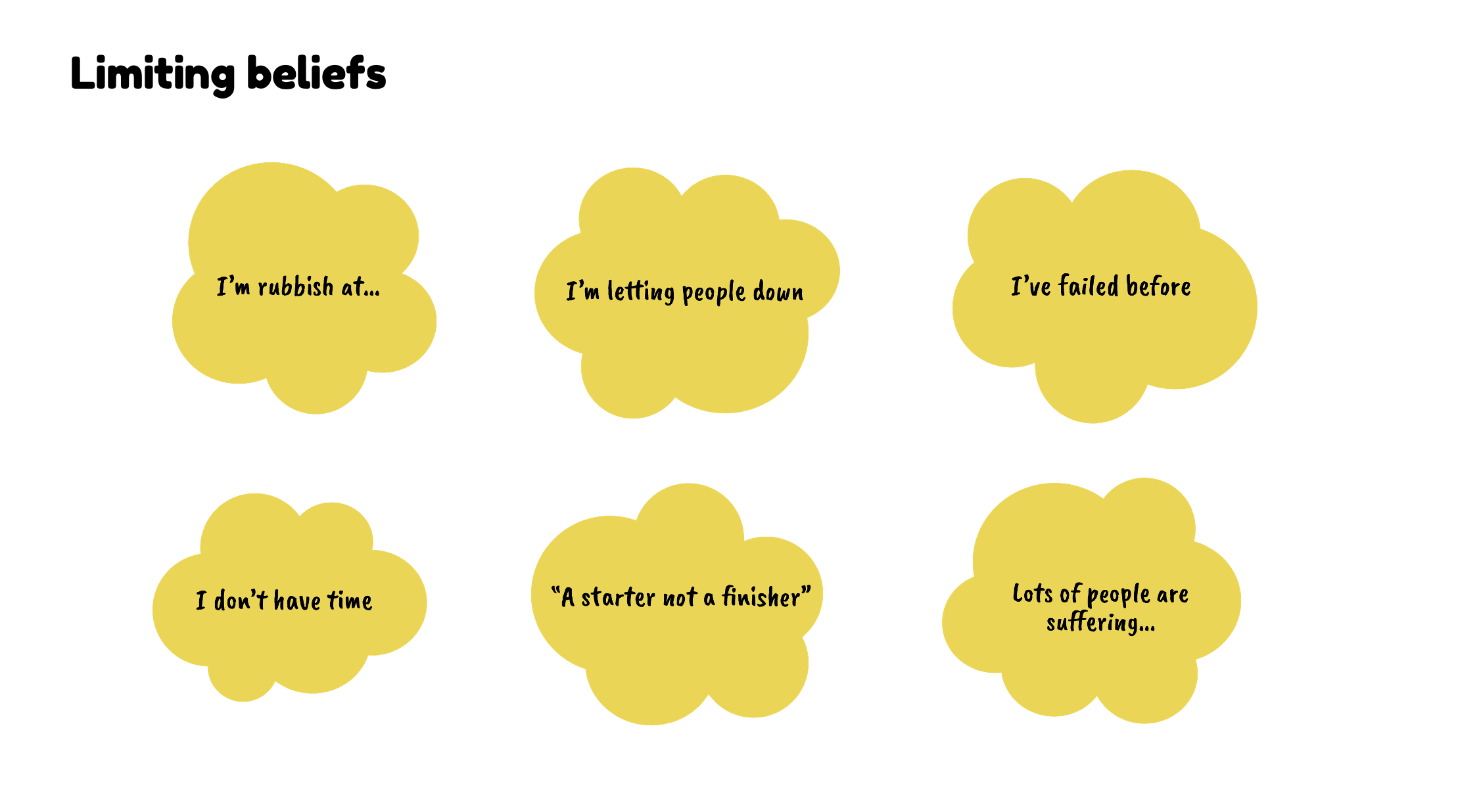 And here are a couple Mary and I discussed:
And here are a couple Mary and I discussed:
1. The Productivity Trap
I share a common limiting belief: the idea that to be successful, we must be busy all the time. This belief often manifests as "performative busyness" - the need to appear constantly occupied and overwhelmed.
I personally held this belief for years, thinking that as a business owner and teacher, I needed to always be visibly, sometimes performatively, busy. This led to multitasking, which ironically decreased my overall productivity and effectiveness. By challenging this belief, I learned that focused work and intentional rest are far more valuable than constant activity. I strive to embrace the ‘one thing at a time’ mantra.
2. The Suffering Comparison
Another limiting belief Mary discusses is the idea that one's pain or struggles are invalid because "others have it worse." This belief can be particularly challenging for those dealing with illness or mental health issues.
Mary gives an example of someone battling cancer who feels they don't have the right to complain or feel anxious because "other people are suffering more." This comparison minimizes personal experiences and can prevent seeking necessary support and care.
Reframing Limiting Beliefs

This coaching approach involves several steps to overcome limiting beliefs:
- Awareness: Recognise the belief and its impact on your life.
- Questioning: Challenge the validity of the belief. Is it based on fact or assumption?
- Reframing: Create a new, empowering belief that better serves your goals and wellbeing.
- Action: Act in accordance with your new belief to reinforce it.
Let's apply this to the examples provided:
Productivity Belief:
- Old belief: "I must be busy all the time to be successful."
- Reframed belief: "My success is measured by the value I create, not by how busy I appear."
Suffering Comparison Belief:
- Old belief: "I don't have the right to feel bad because others have it worse."
- Reframed belief: "My feelings are valid, and acknowledging them allows me to address my needs and practice self-compassion."
It’s essential to approach this process with self-compassion. Change takes time, and it's normal to sometimes fall back into old thought patterns. The goal is progress, not perfection.
Moreover, Mary points out that reframing our beliefs often leads to a more balanced perspective. In the case of the suffering comparison, acknowledging our own pain doesn't diminish the struggles of others. Instead, it allows us to cultivate genuine empathy - both for ourselves and for others.
As this coaching demonstrates, identifying and challenging limiting beliefs is a powerful step towards personal growth and fulfilment. By questioning the thoughts that hold us back and reframing them in a more empowering light, we open ourselves up to new possibilities and experiences.
Remember, this is a journey, and it's okay to take it one step at a time. Whether you're tackling beliefs about productivity, self-worth, or any other aspect of your life, approach the process with patience and kindness towards yourself. As you release these limiting beliefs, you may find yourself capable of achievements you never thought possible.
What limiting beliefs are you ready to challenge and reframe in your own life?
The Values Compass: A Guide to Personal and Professional Alignment
In our journey through our careers and lives, we often find ourselves at crossroads, facing decisions that shape our personal and professional paths. One powerful tool that I've developed in navigating these choices is what I call the "Values Compass." This concept has been a guiding light for me and many of those I've worked with, helping us align our actions with our core beliefs and expectations. It is one of the many powerful tools I share in the Being Your Best, Doing Your Best course that I've developed for Huh Academy: https://huhacademy.com/courses/18-byb-dyb-cohort-24-25/
You can hear me talk through this activity and other activities from the course with Mary Myatt for FREE here: https://huhacademy.com/intro-webinar/18-byb-dyb/
What is the Values Compass?
The Values Compass is a personal collection of principles that guide your decisions, fuel your passions, and define what you stand for. It's not just about what you believe in, but also what you expect from others and the organisations around you.
Why is it Important?
When we live and work in environments that reflect our values, we thrive. Conversely, when we find ourselves in situations that challenge our moral compass, it can significantly impair our wellbeing – mentally and sometimes even physically. I've experienced this firsthand, and it's why I'm passionate about sharing this concept.
Creating Your Own Values Compass
Here's how you can create your own Values Compass. Use this list of values (generated from my work with educators at all levels over the last five years) to help you - this list isn't exhaustive, so feel free to suggest your own values.
- List Your Top Eight Values: Think about the principles that guide you most strongly. You can choose a specific context if you like – as a parent, educator, professional, etc. You don't have to list them in any particular order at this stage.

- Identify Your North Star: Draw a basic compass (or print this one). If you could only choose one value, what would it be? This becomes your "North" on your compass. Write it above the 'north' point. For me, it's integrity. Nothing hurts more than having my integrity questioned or when someone makes unfounded assumptions about me.

- Define Your South: This is your second strongest value. For instance, I might choose reliability. It's something I've had to work on, but it means a lot to me, and I expect it from others too.
- Choose Your East and West: These could be contrasting values that don't necessarily sit comfortably together. For example, I might put empathy in the East because I often experience intense empathyfor others. In the West, I might place excellence, as I always strive to do my best.
- Fill in the Remaining Directions: Place your other values in the remaining spots on your compass, considering how they relate to each other. Here's an example:
Applying Your Values Compass
Once you've created your Values Compass, use it as a tool for reflection and decision-making:
- Hold it up against challenging situations you face. What does that feeling of frustration or dissonance tell you about your values?
- Use it to analyze situations where you've thrived or had the impact you wanted.
- Share it with your team or family to foster understanding and alignment.
Remember, there's no wrong answer. Your Values Compass is unique to you and can evolve over time.
Creating and using a Values Compass has been transformative for me, both personally and professionally. It's a simple yet powerful tool that can help you make decisions that align with your core beliefs, foster better relationships, and ultimately lead a more fulfilling life. I encourage you to take the time to create your own Values Compass – you might be surprised at what you discover about yourself in the process.
If you're happy to share your compass on social media or in the comments, please do! We'd love to see it. And if you'd like more where that came from, do join me and Mary Myatt on our brand new course with powerful coaching tools for leaders at all levels: https://huhacademy.com/courses/18-byb-dyb-cohort-24-25/
Take our quiz to find out how it might benefit you: https://mary-qm81cvoh.scoreapp.com
Grit and Growth: The Joys of Girls' Football
I'm proud of my first non-teaching-related piece in a long time, so re-blogging it here. Originally posted here: https://www.instagram.com/p/C2HZtjfshom/?utm_source=ig_web_copy_link
If you’d told my 20-something self that I’d spend most weekends through my 40s standing by a football pitch, roasting in the sun or soaked to my toes, I’d have snorted. If you told me that it would bring me, and my family, such joy, I’d have laughed in your face. Our daughter, now 14, is a feisty and fearless goalkeeper, playing in the Junior Premier league, alongside two other teams. It’s been the making of her - and us
Like many parents, we tried to put opportunities our kids’ ways from an early age. At 6, gymnastics came to a shouty end, when she interrupted her routine in her first competition to stop over to the instructor, mid-teddy-bear-roll, to ask for clarification on the next instruction with a ‘WHAT?’ that could be heard across the gymnasium. Tragically, piano lessons quickly became a chore that risked putting her off music for life. She’s never been one to sit on the fence when expressing her opinions. Then someone on the school run asked if we’d considered football, and that’s where it began: Chipperfield Corinthians, a mixed village team of five year olds. What could possibly go wrong…?
Plenty did, though the setbacks were greeted with resilience and humour by parents and players alike.
They used to chase the ball like an angry swarm of bees, clumped together as we shouted ‘other way!’ from the sidelines. After 10-0, we’d stop counting the opposition’s goals. Did it put them off? Did it heck. The coaches (unpaid volunteers - even today, for many) were extraordinary in their patience, encouragement and tough love. Dom, Luke and Stewart deserve a name-check, a decade on.
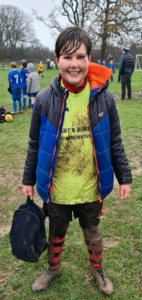
Cut to age 12, when we received a phone call out of the blue. A parent had seen her play in her school team and knew a JPL team, London Football Talent Centre, looking for a keeper. I didn’t know what JPL stood for, but we grasped the opportunity. This took us straight into a residential tournament and took her, at the time a rather quiet and withdrawn type, into sharing a room with fellow teenagers she’d never met - to this day, one of the biggest acts of bravery I’ve seen. As we played Arsenal on ground the texture of razors from the heat of the sun, the temperature hit 38 degrees. ‘It would be cruel to send them on again’ said the coaches (as we scurried back and forth with water and they collapsed and rose in turn from injuries and heatstroke). ‘We’re carrying on!’ said the girls.
Being the parent of a goalkeeper is uniquely stressful. They’re literally the last line of defence and if they mess up, everyone knows about it. Trust me, we’ve seen the silent tears and the closed bedroom door. What we’ve learned is that these girls look after one another. Don’t get me wrong. The sense of justice is strong and I’m not saying that fruity language doesn’t escape when the opposition breaks the rules of decency. But they’re a team, and they stand - and fall, and break - together. They defy the toxic clichés that abound about teenage girls and some days, when I watch them, in this messed-up world, I feel reassured and optimistic that girls like these will be in charge of our world before long. They’re fast, they’re fearless, they’re strong - inside and out. They inspire me as much if not more when they lose as when they win.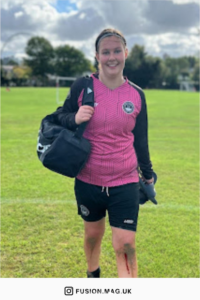
The world is a terrifying place, but for a few hours each week, I get to lose myself, ever the embarrassing parent with the shouty encouragement, on the sidelines of a muddy football pitch . The sidelines don’t care about my to-do list or the stresses of my job. I get to watch these girls sprint and tackle and my daughter pouncelike a cat and dive like a dragon and I feel like the luckiest parent alive.
I’m Emma, and when I’m not a football Mum I teach teenagers and support fellow teachers. If you’re a fellow football parent, do get in touch!
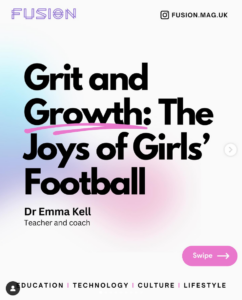
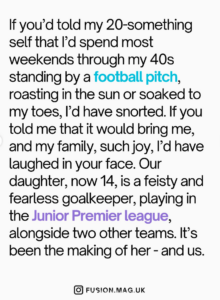
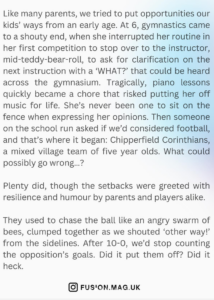
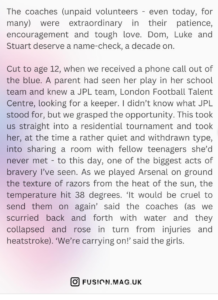
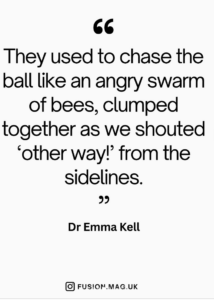
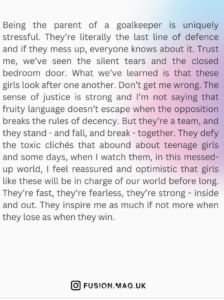
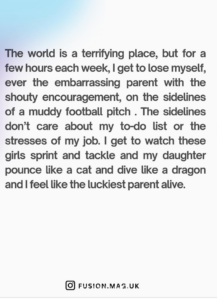
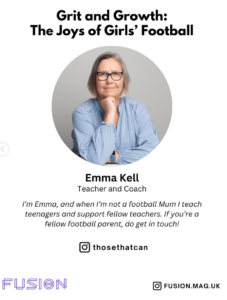
- What’s it really like to work in schools today?
- How do the ‘critical incidents’ in our lives and our work influence our sense of identity and our values and what impact do they have on our likelihood of surviving and thriving in the profession?
- Those moments – or chains of events - we remember with multi-sensory clarity – how have they affected our confidence, our effectiveness at work, our close relationships, and our perceptions of the teaching profession?
- What brings us a sense of reward and fulfilment and results in joy, purpose and satisfaction?
- What bends – and threatens to break us a humans and as educators?
- What lessons can we learn as professions and what lessons can the wider profession take from our stories?

These six ‘little’ (!) questions form the heart of the new book I’m embarking upon for Sage Education. With this new project, I'm building upon my doctorate on balancing teaching and parenthood and my two books, How to Survive in Teaching and A Little Guide to Teacher Wellbeing and Self Care (with Adrian Bethune of Teachappy). Like all my work, it is underpinned by pragmatism, experience, stubborn optimism, and the premise that, however lonely this job can sometimes feel, we are not alone. It will be painstakingly research-based but infinitely accessible over a quick coffee in the staffroom, and it aims to provide practical ways forward for individuals and schools and ultimately have a positive impact on our noble and beleaguered profession.
I want to collect your stories - of key incidents or chains of events that had a profound impact on you - from the apparently incidental to the searingly life-change. I want to amplify your voices – those of the new teachers, the leaders, the teaching assistants, the business managers and all the staff working in schools and share your stories (all of which will be fully anonymised) in order to shine new light on the lived experience of working – hoping to work, or having worked – in schools.
Interested in the findings? Watch this space – I’ll be sharing nuggets and thoughts through the writing journey here and on my Twitter, Instagram and LinkedIn pages.
Would you like to contribute? I’d love to have as big a range of voices as possible, and as the project progresses, will be requesting stories related to specific themes or from specific voices in order to ensure, as far as possible, inclusivity. I won’t have the scope to tell every story in detail but every story will form a piece of the mosaic and the themes you illuminate will all influence the book. Follow this SurveyMonkey link to share your story:
As ever, it is a huge honour and a huge privilege to represent the voices of fellow educators.

26th July 2023
A day in the life of a teacher
I teach part-time in an Alternative Provision setting - all of these things have happened, just not all in the same day. I have blurred details on purpose.
It's been one of those mornings. I'm a bit tired. Had that dream again about losing kids on a school trip. I'm wearing navy tights with a black dress - oops. My lanyard was eventually tracked down to the dog's toy box.
8.55. 'Miss, is this your phone? You really shouldn't leave it lying around.'
I explain that I've been in a bit of a rush. He says, 'We've talked about this before, Miss - slow down!' Then he describes his meticulous morning routine, which includes exercise and carefully-chosen proteins. I've been out-adulted by a 15-year-old.
He's not been with us for long. His files from his other schools make eye-watering reading. He's been 'written off' my more than one school and I sympathise with his former teachers, whilst wondering how on earth it went so wrong, so quickly.
'You know what, Miss? I think I can actually get a Grade 6. I got 33 marks in that last paper. What's another word for 'confused'? Can you mark this bit, please?'
When I first taught him, he stared into space for three consecutive lessons, refusing to engage with any of my lovingly-constructed 'what I wish my teacher knew' sessions, which are usually a dead cert. 'Your earliest memory?' 'Dunno.' 'What scares you?' 'Nuffing.' 'Something that makes you laugh...?' 'Huh?'
9.32. 'Miss. I've told you. I don't speak Shakespeare.'
9.37. 'Miss, man. Juliet was thirteen?! Three days, Miss? That's just WRONG.' [Vomiting noises.]
The SLT member on-call drops by. 'Hand it over, please.' The student realises the contraband jewellery didn't escape notice. She's huffy, but the SLT member manages to make her laugh as she hands it over. The school dog diffuses the remaining tension.
It's breaktime. I missed out my the 10.27 wee-window and I'm working out when I can dip out for the toilet. Another Arsenal vs Spurs debate over waffles. A 'what you looking at?' scuffle, diffused within what feels like seconds - adrenaline levels return to something near normal.
12.43. 'I don't know how to revise! I can't do it! I'm sh*t at this.'
12.46. We've come up with 8 acceptable synonyms for 'sh*t' together'
1.12. Lunch. Another conversation about dogs. A debate about broccoli. Some students go to help with the gardening. Another goes for the drum and bass session. I manage that wee whilst a colleague covers for my duty.
1.28. Someone's left cake in the staffroom. It's gone by 1.37.
2.21. Someone's drawn a penis on the wall.
2.38. There's a new photo on the wall of students at their achievement evening.
3.13. Locker-time. Nike Airforce Ones are reunited with their owners.
3.45. INSET. Really? My brain's stopped working.
4.08. We're talking about our students, what the research tells us, what we know about them, and what makes them tick. My colleagues make me laugh. They inspire me. They make me want to be better.
4.25. Car park empties fast. I'm shattered. I'm proud. Bring on tomorrow.
The View Down the Mountain
Here in England, October half term has finally arrived. If you're feeling shellshocked, numb, grumpy, irritable and/or as if you've been run over by a truck, this is not unusual. Like many of us, I remain a stubborn optimist, but there's no escaping the fact that it's been hugely challenging for almost everyone I've met working in schools since September, and I've had the privilege of meeting hundreds of you to talk about wellbeing, working with parents or for coaching.
Today, I'm extracting myself from the sofa (the weather is practically demanding a duvet day) and studiously ignoring the domestic and family to-list to share a powerful wellbeing tip, based on an idea first shared with me by Emma Turner: turn your to-do list into a 'ta-dah!' list - look at what I've achieved!
Rather than looking ahead at everyone and everything else that demands a piece of you; rather than berating yourself for perceived flaws or mistakes; rather than worrying about the next half term ahead or launching straight into the laundry pile or DIY, can I urge you to take a few moments to look back at everything you've achieved since the beginning of September? Many of you will struggle to start with. 'It's just my job!' you will protest. 'I really haven't done much.' (Our professional is notoriously self-deprecating). I don't believe you.
- That trip you finally managed to run? What effect did it have on the child who's struggle with confidence this term?
- That parent who stopped to thank you at pick-up one afternoon? What exactly did they say? What does it mean for their child?
- That colleague you made a cup of tea for because they were looking a bit frazzled? What did that gesture of humanity mean in a stressful week?
- That student who made eye contact and smiled at you for the first time? How much patience, how many subtle skills on your part did it take to get them to that stage?
The challenges you've survived, the resilience you've shown, the laughs (even or especially the darkly inappropriate ones) in the staffroom, the mutual support, the skills you've learned, the progress your pupils have made, the fact that, even in the last week when you may have been on your knees, you still did it - you still smiled, you still taught, even as the leadership of our country imploded...
Take a moment to give yourself a pat on the back. Note it down somewhere - in a journal, an audio-file or on a few post-it notes. Treasure it. Because you truly make a difference, ever single day and you deserve, in the words of the legendary Rita Pierson, to find joy and a sense of achievement in the invaluable work you do.
On feelings of failure - and redefining success
This photo was taken fourteen-and-a-half years ago. It's of our eldest daughter. The transition to parenthood had been as tough as it was exhilarating. A few weeks before this photo was taken, I'd taken her, with the sacred 'red book' that was her health record, to the GP. Like many new mothers, I had been keen to make breastfeeding work, and was lucky enough that it did. A few sleepless weeks in, we thought a bottle would help my husband and I share things out (and maybe get more than 40 mins sleep in one go). She had other ideas, which she expressed forcefully and with a persistence that turned out to be blueprint for for her nature. Our daughter was born (amidst some crazy complications - she and I would not be here but for modern medicine) on the second centile (in the 'bottom two percent' for size). There was a graph and she regularly dropped below the aspirational line on the growth chart. The growth chart, I was told, was Very Important.
'She's not thriving,' said the GP, on examining the chart. 'You need to introduce formula milk.'
I was devastated. My baby wasn't thriving (or indeed sleeping and she really, no matter how often I was told to 'show her who's boss', take a bottle). I'd clearly done Something Very Wrong. (And remember: she said NO to bottle feeding and it fact subsisted almost exclusively on apple crumble, blueberries and breastmilk for her first 18 months - bye bye, lovingly prepared and frozen Annabel Karmel recipes).
My anxiety hit new levels. Cue: some random woman from the internet insisted on a coffee. (I'd been posting on forum about pregnancy and childbirth). I initially scoffed at this crazy offer for a stranger. She insisted again.
The unspeakably glamorous rando with an unspeakably thriving baby a few months ahead of us entered the café. 'She's not thriving,' I told her, when I managed to remember how sentences worked. 'But look at her!' said my to-this-day closest friend. 'Look at those cheeks! She's fine!'
***
That's the story. I'd been looking at the charts -the GP, it would seem, had only looked at the charts.
As a coach, I regularly meet people tortured with perceptions of their own failures or shortcomings. Impostor syndrome, self-doubt and perfectionism are a regular theme. Some coachees are regularly plagued by with 'what-ifs' when it comes to what others really think.
As professionals, as scholars, a friends, as loved-ones, as parents, dog-owners, vegetarians, women... we are constantly surrounded with arbitrary, contradictory and infinitely potent measures of what we 'should' be in order to be 'good enough'. From the power of Ofsted to dominate school leaders' lives to vocal opinions on social media, the 'not good enough' gremlins have potential feasts wherever we step.
We so often think in binary terms - 'I am smashing it!' 'I'm a total failure.' In truth, life is messy - we can respectively fail and succeed in fifty given ways in several different areas of our lives and our work every single day. But we have control over whether we allow these perceptions and these - very real - feelings to define us. It's not easy, but when the gremlins start to gather and snicker, TAKE CONTROL, and consider:
- Whose opinion do I really, honestly rate?
- How much of my emotional energy does this person/concept/view really deserve?
- What really matters?
- What do I value?
- What have I learned from this?
- If I really want know what others think, I can always ask
Take the boxes and graphs and clichés and gurus and chuck them on a high shelf - or in the bin (sorry, Gina Ford). Give yourself a high five when you know you've done well, and forgive yourself the messy bits and try to find the joy in them too. Our children, our students, our loved-ones, our clients and our friends don't need perfection - they need role models who are flawed and messy and human.
Look at the cheeks, not the graphs.


